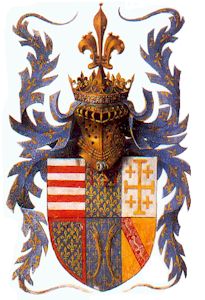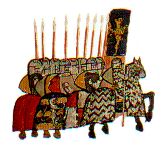| The Barons All noblemen were vassals who vowed to serve their king. But there were many nobles who grew too powerful and out of their king's control. By the 12th century, the stronger barons ruled what could be called little states with their own rules and laws. The finery of their castle-courts were often better than that of their king, and they had permanent armies at their command. These small private armies posed a treat to the king so that he was always checking to make sure his barons were happy. |

|
 |
The Great
Charter (1215 A.D.) King John of England, the youngest son of Henry II, was known for his violent bursts of temper. Due to this he soon annoyed his barons of English-ruled Anjou and Poitiers and lost control of the land. Back in England he taxed his barons heavily and ignored many of their rights. They soon rebelled, and demanded that John should confirm their ancient rights. They forced the king to place his seal on the Magna Carta, a document that limited the king's rights to tax the barons and to punish any man without a fair trial. This document did not recommend equal rights for ordinary people - in fact it scarcely mentioned them at all. However it was the first time for an English king to come under the control of the law. |
||
 |
|
||
Feudal System
The Royal Court
Manor
Life in the towns
Barons
Medieval soldiers
Peasants
Bibliography
Other History Sites
